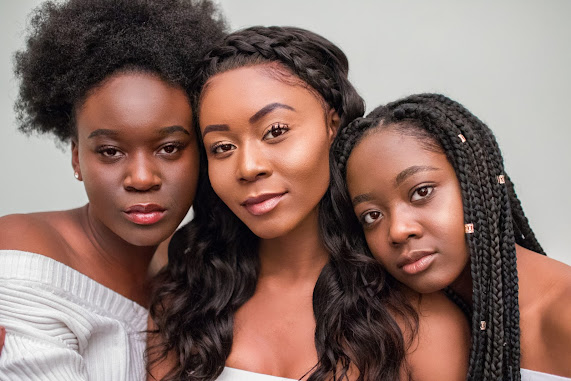Understanding Why Afro Hair Breaks Easily
Afro hair, characterized by its tight curls and coils, is a stunning testament to the diversity of human beauty. However, many people with Afro-textured hair struggle with breakage, often finding their hair to be more fragile than other hair types. Understanding the unique structure and needs of Afro-hair is crucial to addressing this issue and promoting healthy hair growth.
Looking for top-quality hair products? Click below to find the best deals, read trusted reviews, and shop with confidence. Don’t wait—start enjoying the benefits today! 🛒 As an Amazon Associate, I earn from qualifying purchases, at no additional cost to you — Thank you for your support!
The Structure of Afro Hair
The key to understanding Afro hair's tendency to break lies in its structure. Unlike straight or wavy hair, Afro hair grows in tight curls or coils. This unique curl pattern is due to the shape of the hair follicle, which is more elliptical or flat compared to the round follicles of straighter hair types. This shape causes the hair to twist and turn as it grows, creating the beautiful curls and kinks associated with Afro-textured hair.
However, these twists and turns also create points of weakness along the hair shaft. Each bend in the hair strand is a potential point for breakage, as these areas are under more stress and strain than the straighter sections. Additionally, the natural oils produced by the scalp, known as sebum, have a harder time traveling down the length of curly hair. This means that Afro hair tends to be drier, which can contribute to its fragility.
Millie's Hair Oil Products was created to help prevent breakage, help you manage, and help keep your beautiful hair looking its natural best. Shop Now and Unlock the Secret to Healthy Hair with Millie's Hair Oils
Factors Contributing to Afro Hair Breakage
1. Dryness: As mentioned, the tight curls of Afro hair prevent sebum from evenly coating the hair shaft. This leads to dryness, which makes the hair more brittle and prone to breakage. Moisturizing the hair regularly is essential to counteract this natural dryness.
2. Porosity: Afro hair often has higher porosity, meaning it has more gaps and holes in the hair cuticle. High-porosity hair can absorb moisture quickly, but it also loses moisture just as fast. This constant cycle of absorbing and losing moisture can weaken the hair over time.
3. Styling Practices: Certain hairstyles and grooming practices can intensify breakage. For example, tight braids, ponytails, and cornrows can put excessive tension on the hair, leading to breakage at the roots or along the hair shaft. Similarly, the frequent use of heat-styling tools can dry out and damage the hair.
4. Chemical Treatments: Many people with Afro hair use chemical relaxers to straighten their curls. While these treatments can make the hair more manageable, they also weaken the hair structure, making it more susceptible to breakage. The harsh chemicals can strip the hair of its natural oils and damage the cuticle layer.
5. Mechanical Damage: Everyday actions like brushing, combing, and even sleeping can cause mechanical damage to Afro hair. Using the wrong tools or techniques can create unnecessary friction and stress on the hair, leading to breakage.
🌟 Discover Your Perfect Product on Amazon! 🌟
Looking for top-quality hair products? Click below to find the best deals, read trusted reviews, and shop with confidence. Don’t wait—start enjoying the benefits today! 🛒 As an Amazon Associate, I earn from qualifying purchases, at no additional cost to you — Thank you for your support!
Preventing Afro Hair Breakage
1. Moisturize Regularly: Keeping Afro hair well-moisturized is crucial. Use products that are specifically designed for curly or kinky hair, which often contain ingredients like shea butter, coconut oil, and aloe vera to lock in moisture.
Millie's Hair Oil Products was created to help prevent breakage, help you manage, and help keep your beautiful hair looking its natural best. Shop Now and Unlock the Secret to Healthy Hair with Millie's Hair Oils
2. Gentle Handling: Be gentle when detangling and styling. Use a wide-tooth comb or your fingers to detangle, starting from the ends and working your way up to the roots. Avoid brushing hair when it's dry, as this can cause breakage.
3. Protective Styles: Opt for protective hairstyles that minimize tension on the hair. Styles like twists, braids (not too tight), and updos can help protect the hair from mechanical damage and reduce the need for frequent styling.
4. Limit Heat and Chemical Use: Reduce the use of heat styling tools and chemical treatments. When using heat, always apply a heat protectant to shield the hair. If chemical treatments are necessary, ensure they are done by a professional and follow up with deep conditioning treatments to restore moisture.
BONNET QUEEN Silk Bonnet for sleeping Women Satin bonnet Hair Bonnet Night Sleep Cap Scarf wrap for Curly Hair with tie Band Black
🌟 Discover Your Perfect Product on Amazon! 🌟Looking for top-quality hair products? Click below to find the best deals, read trusted reviews, and shop with confidence. Don’t wait—start enjoying the benefits today! 🛒 As an Amazon Associate, I earn from qualifying purchases, at no additional cost to you — Thank you for your support!
5. Night-time Care: Protect your hair at night by using a satin or silk pillowcase or wearing a satin or silk bonnet. These materials create less friction than cotton, helping to reduce breakage while you sleep.
Conclusion
Afro hair, with its intricate curls and coils, is naturally prone to breakage due to its unique structure and needs. By understanding these factors and adopting a hair care routine that emphasizes moisture, gentle handling, and protection, those with Afro-textured hair can minimize breakage and enjoy healthier, stronger hair. Embracing and caring for Afro hair not only helps maintain its beauty but also celebrates the diversity and richness of different hair textures.


.jpg)

